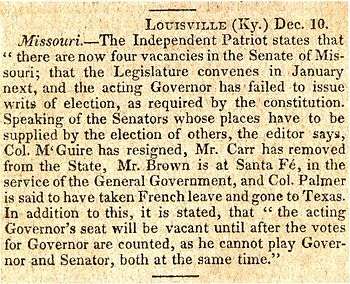French leave

French leave is "leave of absence without permission or without announcing one's departure",[1] including leaving a party without bidding farewell to the host. The intent behind this behaviour is to leave without disturbing the host.
The phrase is first recorded in 1771 and was born at a time when the English and French cultures were heavily interlinked.
In French, the equivalent phrase is filer à l'anglaise ("to leave English style")[2] and seems to date from the turn of the 19th and 20th centuries.[3]
First usage
The Oxford English Dictionary records: "the custom (in the 18th century prevalent in France and sometimes imitated in England) of going away from a reception, etc. without taking leave of the host or hostess. Hence, jocularly, to take French leave is to go away, or do anything, without permission or notice." OED states the first recorded usage as: 1771 SMOLLETT Humph. Cl. (1895) 238 "He stole away an Irishman's bride, and took a French leave of me and his master."
The actual derivation may have its roots in American history during the French and Indian wars. About 140 French soldiers were captured near Lake George in New York and ferried to an island in the lake. The French, knowing the area better than the British, waited until near dawn and quietly waded ashore leaving their captors bewildered on arising. Though its role as such didn't last a day, the island has been named Prison Island.
Military usage
The term is especially used to mean the act of leisurely absence from a military unit.[4]This comes from the rich history of Franco-English conflict; as Spain has a similar saying concerning the French (despedida a la francesa), it may have come from the Napoleonic campaign in the Iberian Peninsula which pitted the French against an Anglo-Portuguese and Spanish alliance.
In other languages
- Czech: zmizet po anglicku ("to leave English style")
- French: filer à l'anglaise ("to leave English style")
- German: sich (auf) französisch empfehlen, literally einen französischen Abschied nehmen ("to take a French leave") or einen polnischen Abgang machen ("to take a Polish leave")
- Hungarian: angolosan távozni ("to leave English style")
- Italian: andarsene all'inglese ("to leave English style")
- Polish: wyjść po angielsku ("to leave English style")
- Ukrainian: піти по-англійськи (pity po-anhliysʹky) ("to leave English style")
- Portuguese: saída à francesa ("to leave French style")
- Russian: уйти по-английски (ujti po-anglijski) ("to leave English style")
- Spanish: despedida a la francesa ("goodbye in the French way", "French farewell")
- Walloon: spiter a l' inglesse ("to leave English style")
References
- ↑ Brewer's Dictionary of Phrase and Fable (Millennium Edition; London: Cassell, 1999)
- ↑ Anu Garg's A.Word.A.Day, September 8, 2008. http://wordsmith.org/words/chinese_puzzle.html
- ↑ "Filer à l'anglaise". Francparler. Retrieved September 7, 2012.
- ↑ For the usage, see for example The war memoirs of Commandant Ludwig Krause 1899-1900, Cape Town 1996, p. 65.